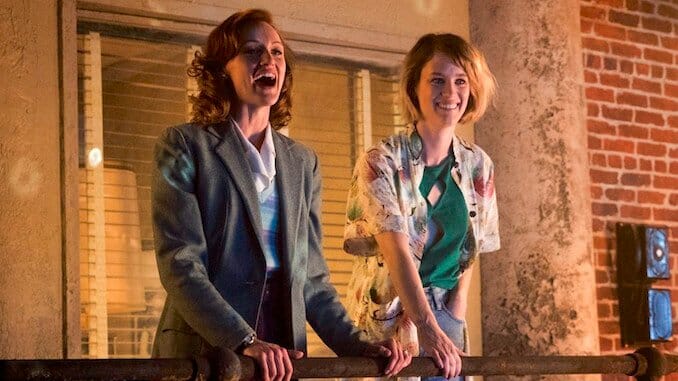TV Rewind: How Halt and Catch Fire Overcame Its Tired Start to Become a Radical Love Story
Photo Courtesy of AMC
Editor’s Note: Welcome to our TV Rewind column! The Paste writers are diving into the streaming catalogue to discuss some of our favorite classic series as well as great shows we’re watching for the first time. Come relive your TV past with us, or discover what should be your next binge watch below:
![]()
When you watch the first season of AMC’s Halt and Catch Fire, you can see why it’s no surprise that, early in its run, it drew multiple comparisons to Mad Men. Billed as a prestige office drama set at the dawn of the age of personalized computing in the 1980s, the show features talented-but-troubled men in a male-dominated profession, an industry on the brink of monumental change, and a drab office enlivened by the hustle and bustle of its main players. It’s rife with professional deceptions and ill-advised secrets and not-so-little tastes of workplace misogyny. Its erratic idea-man, Joe MacMillan (Lee Pace), is clearly the show’s Don Draper, if Don Draper had a Members Only jacket and a working knowledge of computers. Joe charms and lies his way into a position at Cardiff Electric, a mainframe software company in Texas’s Silicon Prairie, and there he recruits bored sales engineer Gordon Clark (Scoot McNairy) to finally do what Gordon failed to do two years earlier: upstage computing giant IBM.
Their ideas are revolutionary, there’s no doubt, but—surprise, surprise!—as the first season unfolds and each man’s genius suffers because of his personal demons. The women in their lives—Joe’s sometimes-lover, the rebellious coder prodigy, Cameron Howe (Mackenzie Davis), and Gordon’s overworked, under-appreciated, tech-expert wife, Donna (Kerry Bishé)—initially suffer too, at the expense of each man’s dedication to success and under the burdensome realities of being women in a man’s world. But once the show shifts its focus to these two women, it becomes something great.
To me, Halt and Catch Fire always had a different tone and structure than Mad Men—it’s more frank, a little less precise, less enamored with the inane—but I wouldn’t blame anyone for getting caught up in the parallels. They’re there, on full display, for all to see. Even Lee Pace himself named Don Draper as an inspiration for Joe’s character. But hiding just beneath the familiar landscape of Joe’s Steve Jobs-wannabe speeches and Gordon’s spousal neglect, there’s a show about the joy of ideas and the virtues of failure, about finding humanity in computers and believing in something (or someone) against all reason. After the uncertain start of Season 1, there’s a love story—though maybe not the one you expect.
When they meet in the women’s bathroom at Cardiff Electric, Donna and Cameron are poised to be women at odds, and they are: Donna is a long-suffering housewife with too much responsibility, Cameron is an outspoken shit-stirrer with no responsibility at all. There’s a natural tension between them that seems destined to sour, especially when Gordon inexplicably lies to Donna about Cameron being a man (and on a lesser show, her character would have been).
But then Cameron loses all of her code to an electrical mishap—later revealed to be a deception on Joe’s part—and the only person who can save the project is Donna. They talk, trade decidedly misogynistic barbs. There’s no magical moment where all of their differences fall away (in fact, Cameron steals Donna’s car for a little joyride), but there is a moment in which they see each other and understand something. Cameron sees Donna’s expertise and offers to watch the Clark children while Donna works. Donna discovers that Joe lied about the incident and realizes that Cameron isn’t as reckless as she seems. “My code was never like yours,” she tells Cameron. “Yours… well, it’s like a piece of music.”
-

-

-

-

-

-

-

-

-

-

-

-

-

-

-

-

-

-

-

-

-

-

-

-

-

-

-

-

-

-

-

-

-

-

-

-

-

-

-

-








































